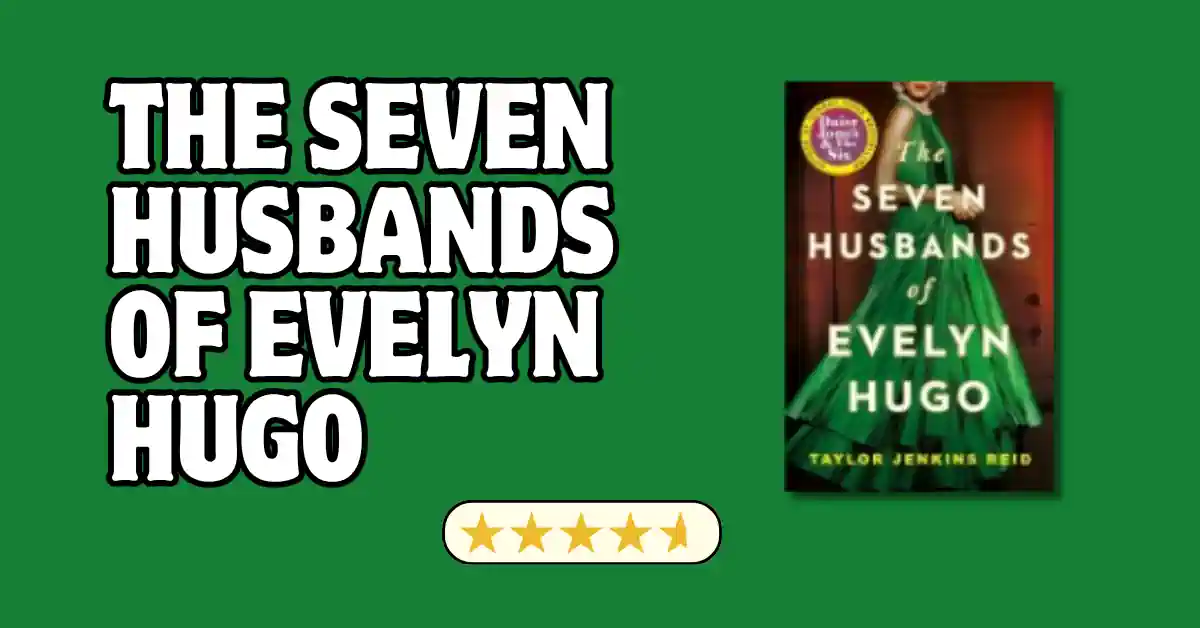The Seven Husbands of Evelyn Hugo: A Detailed Review
At first glance, Taylor Jenkins Reid’s The Seven Husbands of Evelyn Hugo looks like just another Hollywood drama—fancy dresses, messy marriages, and a movie star’s rise and fall. But look past all the glamour, and you’ll find something much more interesting: a story about power, identity, and the impossible choices women have to make in a world that won’t let them write their own stories.
How to Survive and Win
Evelyn Hugo, the Cuban-American girl who turns herself into Hollywood royalty, doesn’t want your pity. She wants control. She knows her beauty is something she can trade, her sexuality is power, and her ambition makes people uncomfortable. If she has to marry seven times to survive in an industry that loves women one minute and throws them away the next, then fine. Evelyn’s coldness isn’t mean—it’s survival turned into an art.
Each husband is more than just a relationship. They’re like chapters in her story, marking how she changes personally and professionally. Some marriages are business deals—smart moves to push her career forward or hide her secrets. Some are for protection—men who gave her cover from scandal or from Hollywood’s judgmental eyes. Some are disasters—relationships that blew up spectacularly and left nothing but damage. But the husbands are never really the point. They’re just supporting characters in a story that’s always been Evelyn’s.
Being Ambitious Without Saying Sorry
What Reid does really well is write about a woman’s ambition without apologizing for it. Evelyn gets to be smart, ruthless, ambitious, and selfish—all things that men in her world got praised for but women got destroyed for. Reid doesn’t make her nicer or more likeable to make readers comfortable. Instead, she makes us face an uncomfortable truth: glamour is hard work, being famous comes with pain, and survival often costs women something men never have to pay.
Evelyn gets the catch-22 of her situation. People worship her and use her at the same time. She’s wanted but also throwaway. Her beauty opens doors, but it also locks her in a cage where getting older, being real, and having freedom are things she can’t afford. She handles this with clear eyes and cold logic that’s both impressive and heartbreaking. She uses what the system gives her—her face, her body, her charm—and she uses them perfectly. But she also knows these things won’t last forever, and that makes her plan ahead in ways male stars of her time never had to think about.
Who Gets to Tell the Story
The book also asks questions about who controls the story. Evelyn’s choice to tell her story to Monique, a pretty unknown journalist, isn’t random. She’s controlling her legacy right up to the end. Reid’s pointing out something bigger here: women’s stories have almost always been told by other people, and almost always gotten twisted. Men write their own life stories; women have theirs written about them—usually by men, usually after they’re dead, usually without permission. So Evelyn telling her own story is both a performance and taking back what’s hers.
By picking Monique—young, ambitious, but not bitter yet—Evelyn makes sure her story gets told with depth, not just trashy headlines. She wants to be understood, not cleaned up or turned into gossip. This is a woman who’s spent decades being photographed, interviewed, and watched, but never really seen. Telling her own story, her own way, is her final rebellion in a life full of careful compromises.
The Drama Is the Point
Sure, the book goes big on drama—lovers separated by bad timing and cruelty, huge scandals that wreck careers, a crushing secret that explodes at the end. But that’s intentional. Hollywood itself is drama, a myth-making machine that turns messy, real people into types: the innocent girl, the dangerous woman, the washed-up star. Reid writes Evelyn as both a victim of this machine and someone who helps build it—she plays along with the lies, but she’s also bold enough to use them for herself.
The book’s structure copies classic Hollywood: flashbacks, big reveals, dramatic irony. We know from page one that Evelyn’s life has been wild, but Reid gives us details like a good screenwriter, making sure each reveal hits hard. The drama isn’t a problem—it’s part of the DNA, and Reid uses it to show how fake fame really is. Every scandal, every marriage, every carefully planned public moment is a show. Evelyn knows it. Reid knows it. And by the end, we know it too.
The Real Love Story
What makes The Seven Husbands of Evelyn Hugo more than just a Hollywood story is how it explores being queer in a time when that could destroy your career. Evelyn’s real love—her truest, longest relationship—is with a woman, and that’s the love she’s protected most fiercely. The seven husbands are basically elaborate cover stories, performances to protect the one relationship that actually mattered.
Reid handles this carefully, not using it as a cheap twist. Instead, it makes us understand Evelyn’s choices better. Her ruthlessness makes more sense when we realize it was always about protecting something fragile and true. The real tragedy of Evelyn’s life isn’t that she married seven times, but that she lived in a world where loving a woman required so much hiding. Her survival wasn’t just about her career—it was about love.
A Main Character Who Refuses to Be Perfect
In the end, The Seven Husbands of Evelyn Hugo isn’t really about husbands at all. It’s about women, about surviving, about the messy, unglamorous work of grabbing power in systems that would rather see you as decoration. Evelyn isn’t moral. She isn’t consistent. She isn’t nice. And that’s exactly why she feels so real.
She makes choices that hurt people—people she loves, people who trust her. She can be breathtakingly selfish and breathtakingly giving, sometimes in the same moment. She’s vengeful and fragile, closed-off and kind. She’s full of contradictions, and Reid doesn’t try to make them all fit into a neat lesson. Evelyn isn’t a warning or an inspiration. She’s just herself—flawed, powerful, and completely human.
Taylor Jenkins Reid gives us a character who’s stunning and difficult, glamorous and ugly, but most of all… impossible to forget. In a book world still full of women who have to be either saints or victims to matter, Evelyn Hugo is a challenge: complicated, unapologetic, and totally on her own terms. The book asks us to sit with that discomfort, to admire a woman we might not even like, to mourn a love story that was never allowed to exist openly.
And in doing that, it reminds us that the most interesting stories are rarely the most comfortable ones.

Curious to know who Evelyn Hugo really loved—and why the truth took a lifetime to tell?
Disclosure: This is an Amazon affiliate link. I may earn a small commission at no extra cost to you.






